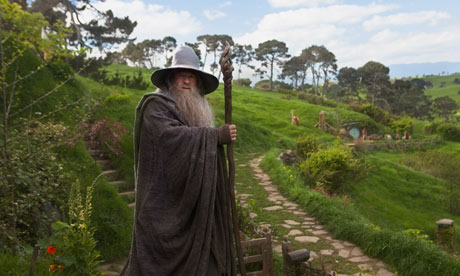Now where have we seen this before? ... Ian McKellen as Gandalf in The Hobbit: An Unexpected Journey. Photograph: James Fisher/AP
News about Peter Jackson's ever-expanding Hobbit project continues to appear. Last month he announced that "the richness of the story of The Hobbit, as well as some of the related material in the appendices of The Lord of the Rings, allows us to tell the full story of the adventures of Bilbo Baggins," by translating it into three movies. Over the weekend, Warner Bros confirmed that the three films will be titled An Unexpected Journey, The Desolation of Smaug and There and Back Again.
The Hobbit is a shorter book than even The Fellowship of the Ring alone, and it tells a pretty snappy story, with a more upbeat, playful tone than The Lord of the Rings trilogy. It is debatable whether the novel could reasonably be stretched to two films, and so responses to the news that it will now be stretched much further are pretty mixed. Some fans are glad at the project of more time spent in Middle Earth, and are pleased to hear that Jackson will incorporate material from the appendices to LOTR. Others are not so glad, and you can read fan responses on Jackson's Facebook page, as well as on a whole bunch of other movie sites.
The critique is pretty simple – Jackson and his team are stretching a simple story beyond reasonable limits to make more money from ticket sales. Harry Potter was the first franchise to split books, turning the Deathly Hallows into two separate movies. Although there was some creative rationale for the split – Deathly Hallows was a long book, and it meant we got two tonally distinct movies – it's also true Warner Bros probably increased its grosses by many hundreds of millions in the process. Other franchises, including Twilight and The Hunger Games, have since followed suit. Jackson, though, seems to be taking this idea to extremes, and many fans are up in arms at what they see as a blatant cash grab.
I'm not sure I agree this will be a total bust: I generally like my blockbusters slow and introspective, so this change may work for me as a viewer. I'm also not sure money is the only factor. In fact, I think something much more dispiriting has motivated the decision: creative stagnation.
Jackson started out as a director of low-budget horror movies in New Zealand. Although he came to Hollywood in the late 1990s, he had never had any major hits, and his background meant he was an unusual figure to take on a property as big as LOTR. But Warner Bros and New Line took a chance on him, and were rewarded with a remarkably successful series of films – successful at the box office, but also successful as creatively daring and accomplished movies.
Since then, though, Jackson has struggled to recreate the success. His long-gestating King Kong made money, but was also bloated and oddly shoddy (for example, the original soundtrack was dumped weeks before release, and a bland generic score took its place, which undercut many of the film's intended emotional beats). The Lovely Bones has its supporters, but it was a critical and commercial failure.
Full story at The Guardian
The Hobbit is a shorter book than even The Fellowship of the Ring alone, and it tells a pretty snappy story, with a more upbeat, playful tone than The Lord of the Rings trilogy. It is debatable whether the novel could reasonably be stretched to two films, and so responses to the news that it will now be stretched much further are pretty mixed. Some fans are glad at the project of more time spent in Middle Earth, and are pleased to hear that Jackson will incorporate material from the appendices to LOTR. Others are not so glad, and you can read fan responses on Jackson's Facebook page, as well as on a whole bunch of other movie sites.
The critique is pretty simple – Jackson and his team are stretching a simple story beyond reasonable limits to make more money from ticket sales. Harry Potter was the first franchise to split books, turning the Deathly Hallows into two separate movies. Although there was some creative rationale for the split – Deathly Hallows was a long book, and it meant we got two tonally distinct movies – it's also true Warner Bros probably increased its grosses by many hundreds of millions in the process. Other franchises, including Twilight and The Hunger Games, have since followed suit. Jackson, though, seems to be taking this idea to extremes, and many fans are up in arms at what they see as a blatant cash grab.
I'm not sure I agree this will be a total bust: I generally like my blockbusters slow and introspective, so this change may work for me as a viewer. I'm also not sure money is the only factor. In fact, I think something much more dispiriting has motivated the decision: creative stagnation.
Jackson started out as a director of low-budget horror movies in New Zealand. Although he came to Hollywood in the late 1990s, he had never had any major hits, and his background meant he was an unusual figure to take on a property as big as LOTR. But Warner Bros and New Line took a chance on him, and were rewarded with a remarkably successful series of films – successful at the box office, but also successful as creatively daring and accomplished movies.
Since then, though, Jackson has struggled to recreate the success. His long-gestating King Kong made money, but was also bloated and oddly shoddy (for example, the original soundtrack was dumped weeks before release, and a bland generic score took its place, which undercut many of the film's intended emotional beats). The Lovely Bones has its supporters, but it was a critical and commercial failure.
Full story at The Guardian






